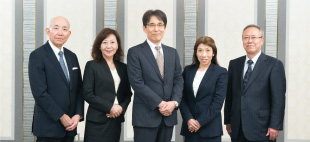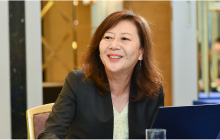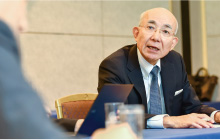
Special Project: Round-Table Talk with Outside Officers
Achieving sustainable growth and the higher corporate value by reflecting a diverse range of value in management
Opinions and suggestions about the Board of Directors and its operation
Developing medium- to long-term strategies for sustainable growth by encouraging active discussions that go beyond the boundaries of responsible businesses.
--What are your thoughts on the Board of Directors of the company and its operation? Do you have any suggestions?
Kawabata:I have attended the Board of Directors meetings held over the past year, and feel there is a nice open atmosphere in which everyone can freely speak their mind. Each agenda item is explained in detail beforehand in an advance briefing, making it easy for the outside officers to understand them, ask the right questions, and present opinions. This is a point I believe deserves to be rated highly.

Taira:When I first became an Audit & Supervisory Board member in 2011, it still seemed that communication between executives and outside officers was rather awkward. When an outside director asked a question, an executive officer would flash an uncomfortable look. This response made us mindful of what we said, and wonder whether we should even ask questions like that. However, since then everyone has become able to state their opinions and freely ask questions, just as Mr. Kawabata said. I feel that everyone who attends meetings make it a point to carefully listen to our opinions and seriously consider them.
Suzuki:I think that the executive officers were originally confused because the outside directors asked strange questions and made some unexpected statements. However, the real meaning behind the presence of outside officers is to state thoughts from an outside perspective and offer a diverse range of views. I think that they should say what’s on their mind and not worry about us or the atmosphere in the room.
Ichige:I feel that is very important. In a certain sense, executive officers are professional business managers, so they should be able to make more rational decisions about individual management issues than us outsiders.
In addition, they all have detailed knowledge about business. However, this means there could be times when there is information or knowledge that is implicitly shared among them. As a result, agenda items are taken for granted and passed without checking whether this implicit knowledge is really true.
Taira:That’s right. It seems that people at AEON MALL as well as the retail industry tend to tacitly accept the notion that the growth strategy is synonymous with “expanding business by aggressively developing new stores by borrowing large amounts of money.”
Ichige:Outside directors can help deepen the level of discussions at Board of Directors meetings by raising doubts or making statements from different angles that challenge the common sense notions in the industry and implicit knowledge of the company. This will help us make better and more accurate management decisions.

Kawabata:I would also suggest holding more active discussions on medium- to long-term management themes at the Board of Directors meetings, such as how AEON MALL should go about achieving sustainable growth in the future.
Taira:I agree. To do that, we need to make the Board of Directors meetings opportunities for executive officers to discuss issues related to other departments and the company-wide management themes in greater depth. This would give the board members a stronger sense of ownership that goes beyond the boundaries of business departments of which they are in charge.
Suzuki:The Board of Directors members are directors first, and those duties come before handling the execution of business. They are responsible for the management decisions of other departments as well, and must actively, and not passively, comment on issues affecting those departments. The mutual supervisory function of directors can be exerted more naturally when vigorous discussion extends beyond the bounds of departments.
Kawabata:There is a total of 73 items in the Corporate Governance Code, but the one that is believed to be particularly difficult to apply is evaluating the Board of Directors. I would love for the directors to comply with this item by deepening the level of discussions, and by adopting a means for the self-review and mutual review of directors. I believe that if they can achieve these two aims, AEON MALL will become a wonderful company as well in terms of governance.
Ichige:In addition, it would be nice to set up a means for executives to pass on the issues that come up at each Board of Directors meeting, including the opinions of outside officers, as feedback through the PDCA cycle. This would help to further enhance our monitoring capabilities.


